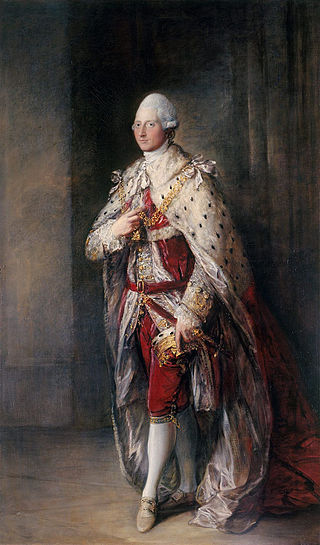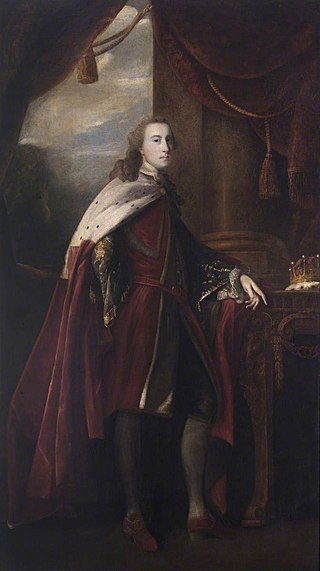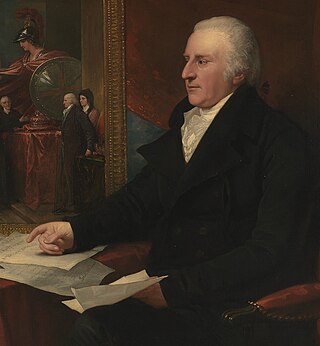Related Research Articles

Oliver Goldsmith was an Anglo-Irish writer best known for his works such as The Vicar of Wakefield (1766), The Good-Natur'd Man (1768), The Deserted Village (1770) and She Stoops to Conquer (1771). He is thought by some to have written the classic children's tale The History of Little Goody Two-Shoes (1765).

Sir William Chambers was a Swedish-Scottish architect, based in London. Among his best-known works are Somerset House, and the pagoda at Kew. Chambers was a founder member of the Royal Academy.

Christoph Martin Wieland was a German poet and writer, representative of literary Rococo. He is best-remembered for having written the first Bildungsroman, as well as the epic Oberon, which formed the basis for both Friederike Sophie Seyler's opera of the same name and Carl Maria von Weber's opera of the same name. His thought was representative of the cosmopolitanism of the German Enlightenment, exemplified in his remark: "Only a true cosmopolitan can be a good citizen." He was a key figure of Weimar Classicism and a collaborator of Abel Seyler's theatre company.
This article contains information about the literary events and publications of 1704.

Prince Henry, Duke of Cumberland and Strathearn was the sixth child and fourth son of Frederick, Prince of Wales, and Princess Augusta of Saxe-Gotha, and a younger brother of George III. His 1771 marriage to a commoner against the King's wishes prompted the Royal Marriages Act 1772.

William Legge, 2nd Earl of Dartmouth, PC, FRS, styled as Viscount Lewisham from 1732 to 1750, was a British statesman and philanthropist who served as Secretary of State for the Colonies from 1772 to 1775, during the initial stages of the American Revolution. He is also the namesake of Dartmouth College.

John Russell, 6th Duke of Bedford,, known as Lord John Russell until 1802, was a British Whig politician who notably served as Lord Lieutenant of Ireland in the Ministry of All the Talents. He was the father of Prime Minister John Russell, 1st Earl Russell.

Henry Scott, 3rd Duke of Buccleuch and 5th Duke of Queensberry KG FRSE was a Scottish nobleman and long-time friend of Sir Walter Scott. He is the paternal 3rd great-grandfather of Princess Alice, Duchess of Gloucester, and the maternal 4th great-grandfather of Prince William of Gloucester and Prince Richard, Duke of Gloucester.

George Keppel, 3rd Earl of Albemarle KG PC, styled Viscount Bury until 1754, was a British general and nobleman. He is best known for his decisive victory over the Spanish during capture of Havana in 1762, as part of the Seven Years' War.

David Martin was a Scottish painter and engraver. Born in Fife, he studied in Italy and England, before gaining a reputation as a portrait painter.

Sir John Eardley Wilmot PC SL, was an English judge, Chief Justice of the Common Pleas from 1766 to 1771.

Jacob Abraham Uitenhage de Mist was a Dutch statesman. He was the Head of State of the National Assembly of the Batavian Republic from 17 April 1797 – 1 May 1797, and Commissioner-General of the Cape Colony during the Interregnum from 21 February 1803 – 25 September 1804, in accordance with the short-lived Treaty of Amiens. The Cape Colony had been under Dutch control from 1652.

Edward Rushton (1756–1814) was a British poet, writer and bookseller from Liverpool, England. He worked as a sailor aboard a slave ship as a young man, and became an abolitionist as a result. After losing his own vision, he opened a school for the blind, the oldest such school in continuous operation in the world.
Robert Charles Dallas was a Jamaican-born British poet and conservative writer. He is known also for a contentious book on Lord Byron, and a history of the Second Maroon War.

Thomas Mortimer (1730–1810) was an English writer, known for his works in the field of economics, and for first documenting the financial terms bull and bear, in use in London at that time.
Maurice Morgann (1725-1802) was a colonial administrator and Shakespearean literary scholar. He is best known for An Essay on the Dramatic Character of Sir John Falstaff.
Sir William Rough (c.1772–1838) was an English lawyer, judge and poet.
Emma Jane Greenland was an English painter, writer and singer. She was awarded a Gold Pallet on 14 November 1786 by the Society at London for the Encouragement of Arts, Manufactures, and Commerce. Greenland may have been a pupil of Johann Christian Bach, and she owned some of his manuscripts after his death. Greenland died in 1838.
The Society for the Encouragement of Arts, Manufactures and Commerce, founded in 1754, was the precursor of The Royal Society for the Encouragement of Arts, Manufactures and Commerce now more usually known as the RSA. The original Society gained the Royal prefix in the Edwardian era, when the Prince of Wales was its President. Its primary aim was to stimulate industry through the awarding of prizes.
John Millan (1701–1782) was a printer and bookseller at Charing Cross, London. After his death, his business was taken over by Thomas Egerton and his brother John Egerton.
From: The Booksellers, Henry Dell, 1766.
MILLAN deserving of the warmest praise,
As full of worth and virtue as of days;
Brave, open, gen'rous, 'tis in him we find,
A solid judgment, and a taste refined.
Nature's most choice productions are his care,
And them t'obtain no cost or pains does spare,
A character so amiable and bright,
Inspires the Muse with rapture and delight:The Gentleman and Tradesman both in him unite.
References
- 1 2 3 4 5 Knight 1887.
- ↑ Burt, Daniel S., The Chronology of American Literature: America's literary achievements from the colonial era to modern times, Houghton Mifflin Harcourt, 2004, ISBN 978-0-618-16821-7, retrieved via Google Books
- Attribution
![]() This article incorporates text from a publication now in the public domain : Knight, John Joseph (1887). "Cockings, George". In Stephen, Leslie (ed.). Dictionary of National Biography . Vol. 11. London: Smith, Elder & Co.
This article incorporates text from a publication now in the public domain : Knight, John Joseph (1887). "Cockings, George". In Stephen, Leslie (ed.). Dictionary of National Biography . Vol. 11. London: Smith, Elder & Co.